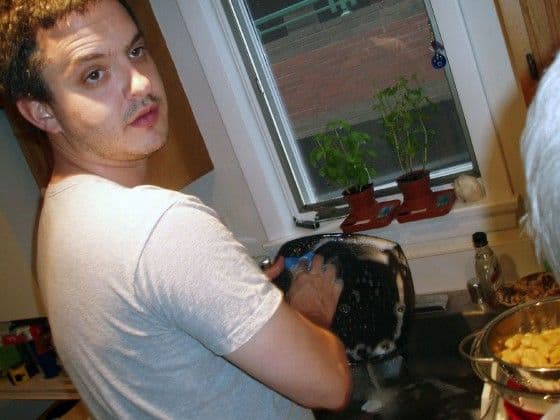In 1982, two social scientists by the name of James Q. Wilson and George L. Kelling came up with a new criminological theory they called the broken windows theory. This theory suggests that when vandalism is clearly present, people tend to commit more acts of vandalism (and more serious crimes) themselves. I found this concept very interesting, and over the past year realized that this applies to a lot more than just acts of vandalism; it applies to things as simple as unwashed dishes.
Have you ever noticed that if you leave a few dishes in the sink overnight, you don’t really feel like dealing with them the next morning? You’ll do it later, you tell yourself. Then, when you get home from work, you make some dinner, and the pile of dishes grows. By then, you’ve got quite a stack… it’s daunting, and you don’t really feel like washing them. I’m sure you can see where I’m going with this.
The Dirty Dishes Theory
In my newly coined dirty dishes theory, I’m going to suggest that when there’s mess around the home, people will be more likely to create more mess – be it piles of dishes, dirty laundry strewn around, or simply household items that weren’t put back in their proper place. Mess begets more mess.
I don’t think anyone actively likes having a messy home, any more than they like having a messy car or work environment. It just happens, and as the pile of mess grows, so too does our dread of cleaning it up. When your place is already messy, tossing one more shirt on the floor doesn’t really look out of place. Thankfully, there’s a very simple solution to this problem – one that you may have already guessed.
Cleaning Dirty Dishes
What I’m about to propose is neither original nor revolutionary, but I assure you it works. It takes the common sense and practicality of batching tasks (you wouldn’t put one sock at a time in the laundry, would you?) with what I would argue is the necessity of cleaning up quickly to avoid perpetual mess.
Simply put, decide on set thresholds or times to clean “things”. By that I mean your dishes, your laundry, or the growing collection of dirt on the floor from lack of vacuuming. Some things should be batched like dishes or laundry, and some things should be done intermittently, like vacuuming or cleaning the bath tub. Make a conscious decision that after cooking and eating a meal, you’re going to clean the dishes up right away. Decide that when you finish the laundry, you’re going to put your socks and underwear away immediately instead of leaving them piled on the floor.
The goal is not to spend all your time cleaning; you have better things to do, like play games and watch porn. No, the goal is to keep your place clean with the least amount of time and effort possible. You could argue that there’s no inherent need to keep things tidy, and you’re right… but doesn’t it look better? Don’t you feel great having a tidy place? I think it’s worth the little bit of effort, and unless you’re buying new dishes every time you make dinner, well… you’ll need to clean them eventually anyway.
[Photos by Roxanne Ready and JJ]

